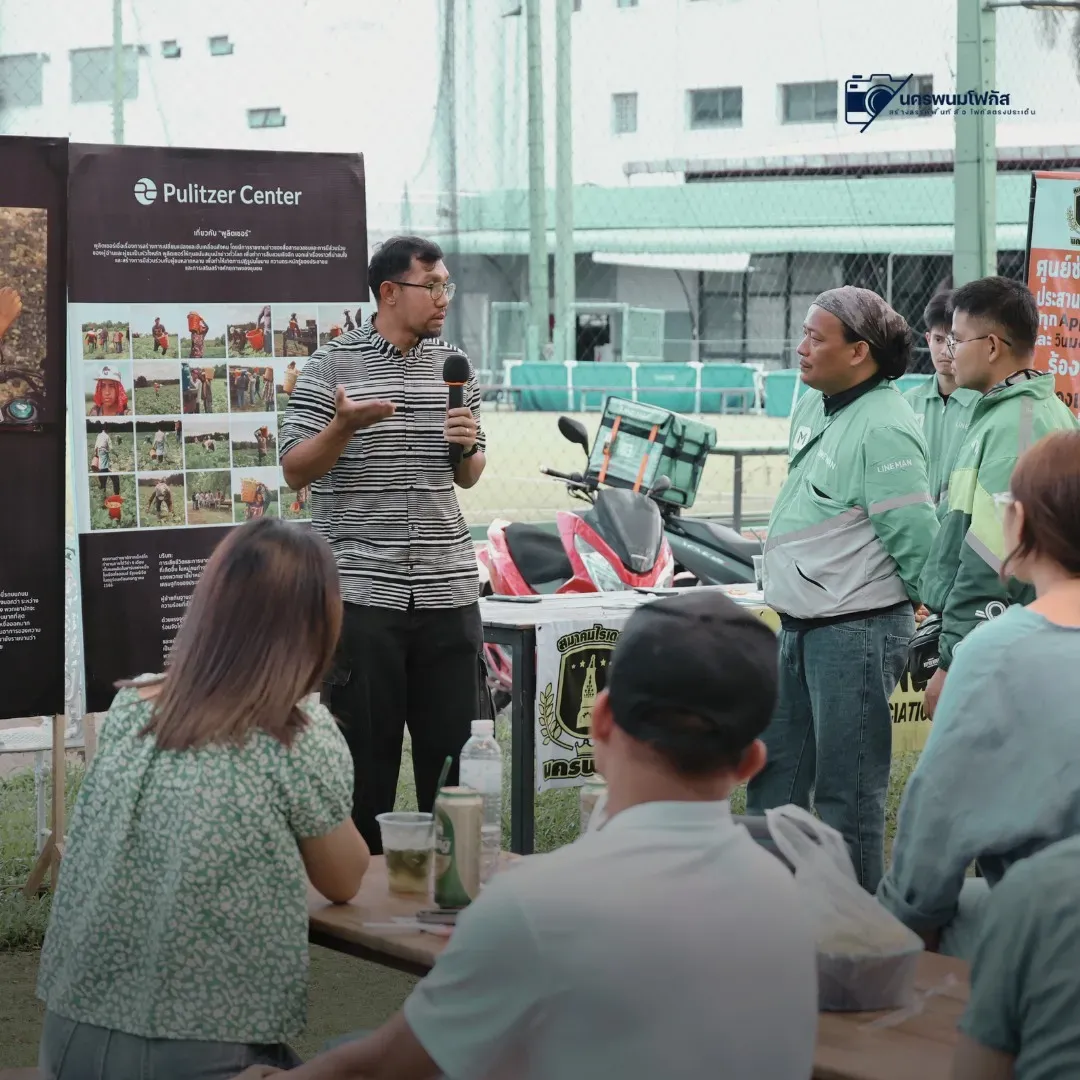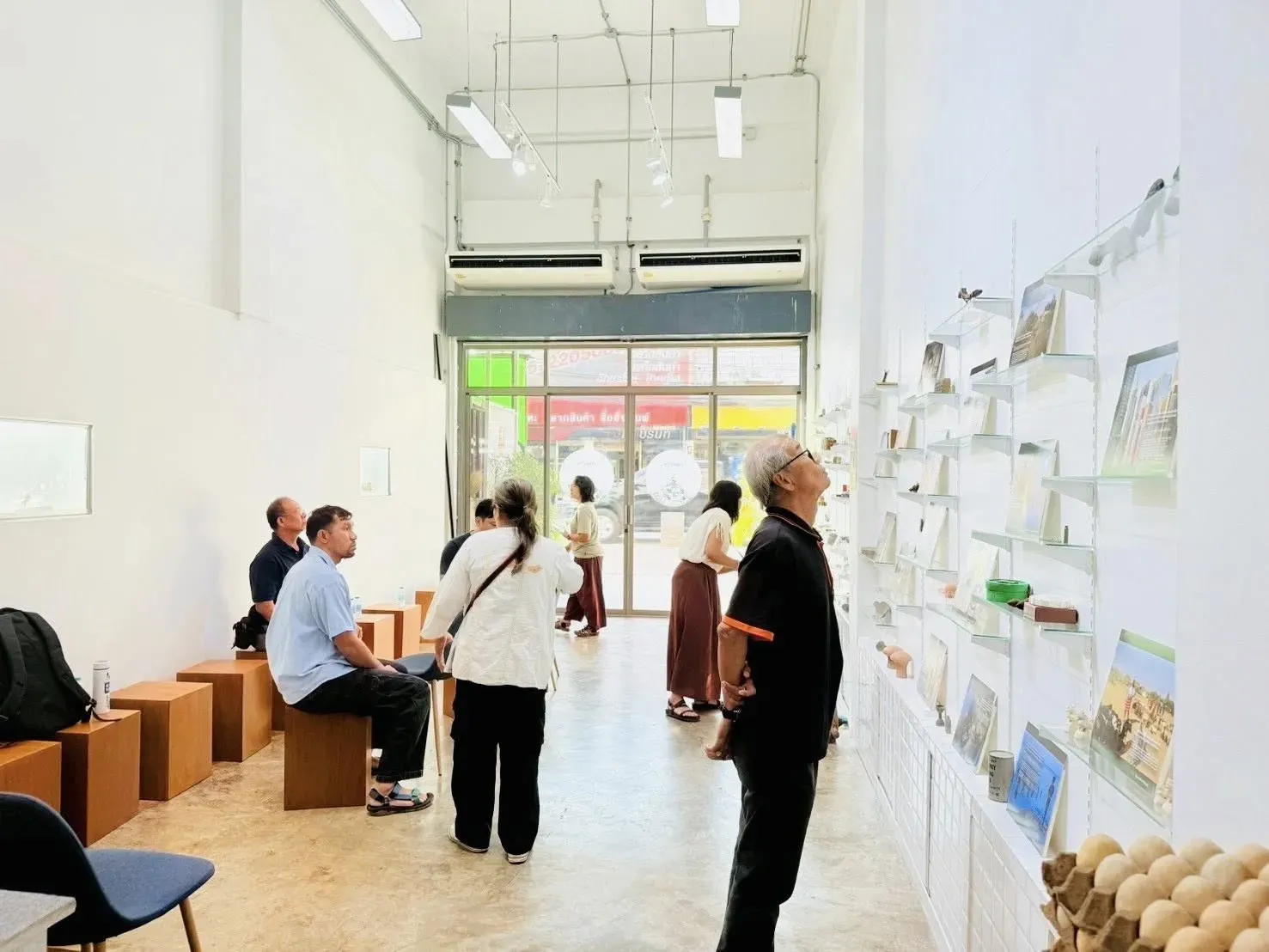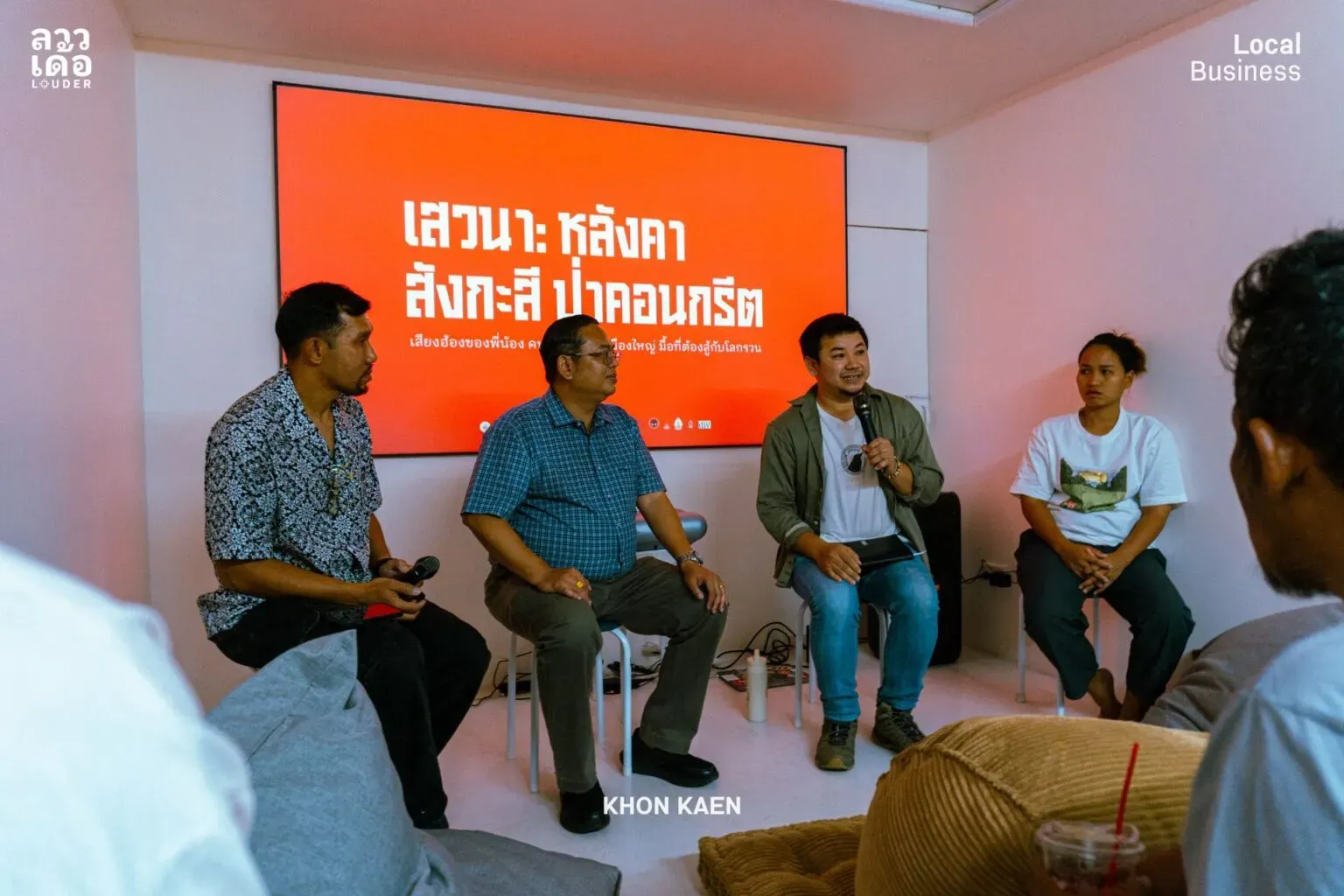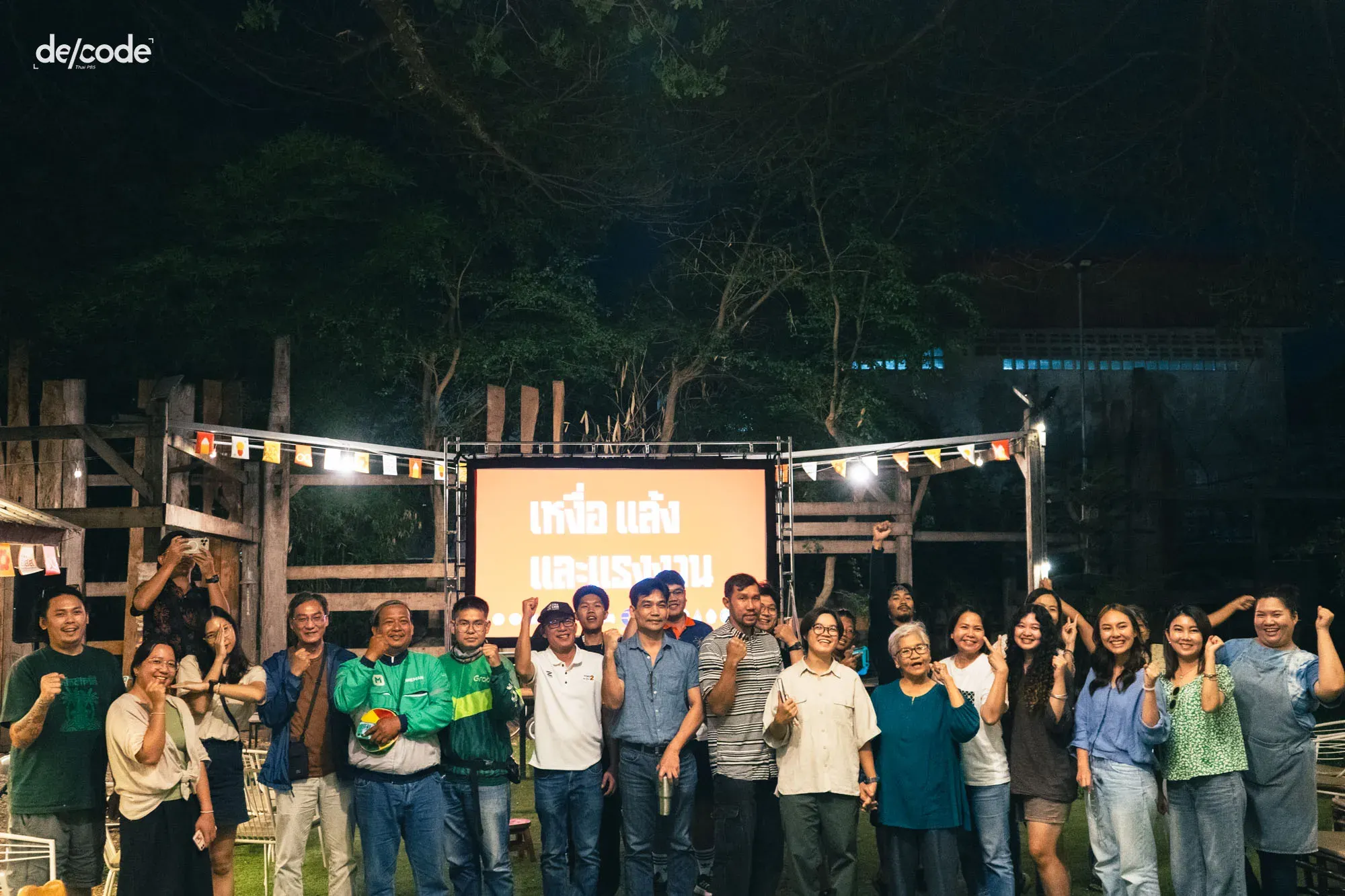
Isan, or northeast Thailand, is one of the largest regions in the country. Workers from Isan migrate within and outside the region in search of better economic opportunities. Many take up outdoor work that makes them vulnerable to climate-related stress, which affects their health, productivity, income, and well-being.
Isan’s example shows labor, migration, and climate change are deeply connected. Many migrant workers are employed as domestic workers, security guards, and construction workers in Bangkok. While many others migrate as far as Israel to work on tomato farms.
The Pulitzer Center launched on May 9-11, 2025, a collaborative campaign called "Sweat, Drought, and Labor" to raise awareness and bring together various stakeholders to discuss the impact of extreme weather and climate change on outdoor workers from and within Isan. The campaign featured movie screenings, photo exhibitions, and discussions among diverse stakeholders who explored the theme of labor and climate. "Sweat, Drought, and Labor" also highlighted perspectives from outdoor workers, who voiced their concerns to government officials and laid out what can be done to protect outdoor workers.
“Weather and climate have impacts on [our] work,” said Sanya Sangchana, who works as a delivery agent and is a member of the Khon Kaen Riders Union. “Most people order food from 11:00am to 2:00pm. By 3:00pm, we have to take a break because it’s so hot. Even if we drink water, it won’t help at all. And the wages of the delivery workers are also squeezed to be low.”
More than 100 stakeholders took part in the campaign and joined as participants and attendees. They included members of local microcinema networks, scholars, representatives from the civil society sector, worker representatives, and members of regional and national media.
Understanding the impact of climate on labor

The "Sweat, Drought, and Labor" campaign, which took place across three provinces in Thailand, provided a much-needed platform.
“As an event organizer, I found that this event was a good start for sparking conversations about labor and global warming,” said Theerayut Weerakham, director of Phanomyong Nakhon Rama, one of the key organizers of the event. “Previously, many people viewed the two issues as separate, which is also reflected in the bureaucratic system. But as the organizer, both personally and through discussions and observation, I discovered that some participants were already aware of this issue but lacked the platform to communicate about it. The event helped clarify the issue through various tools, such as documentary films, photo exhibitions, seminars, and natural discussion forums.”
There were three screening programs curated by the local microcinema network across the three provinces: ALIEN Artspace in Khon Kaen, Noirrow Artspace in Udon Thani, and Phanomyong Nakhon Rama in Nakhon Phanom.
Each movie program was tailored to each of the provinces’ issues. Three Pulitzer Center films—Qatar’s World Cup Building Boom: Too Hot To Work, As For Us, and Can India Adapt to Extreme Heat—were shown.
Sidrah Fatma Ahmed, a Pulitzer Center grantee who produced one of these films, shared what she learned from reporting on climate and labor issues in a recorded video that was screened before the films.
“Communities that are being affected need to be heard and their ideas need to be taken into account as policies are changed,” she said. “Supporting communities such as us [journalists and civil society organizations] need to understand the world is changing. We need to create spaces for them [workers] so they cope and do better.”
On the other hand, Pulitzer Center-supported stories and photos were showcased to further the understanding of the connection between climate and labor issues in different industries across the world.
Following the film screenings, informal discussions among participants centered on the challenges outdoor workers face in Isan.

Furthermore, academics, workers, labor advocates, and members of the media took part in panel discussions about issues pertinent to each province.
In Khon Kaen, a major city in Isan, the discussion focused on how extreme climate events affect outdoor workers in the urban setting. The discussion at Udon Thani addressed the problems faced by agricultural workers who have been affected by extreme weather. And the dialogue in Nakhon Phanom centered on the working conditions of outdoor workers abroad and those in the delivery service sector.
Envisioning action and solutions
Outdoor workers shared their experiences during the events in each of the three provinces and helped shape the conversation on finding solutions.

In Khon Kaen, they described how PM2.5 dust, rain, and floods prevent them from working and lead to a loss of daily income. Farmers from Udon Thani shared how extreme climate events make agricultural practice harder and exacerbate pollution from mining projects in the province. Delivery workers from Nakhon Phanom talked about the hardships that come with heat and climate change, insufficient income, and the lack of welfare measures.
“The hot weather meant I could work less and lost income. People in the community were the same—they couldn’t work. Then came the dust problem, and I felt unwell. Already suffering from multiple hardships, I was pressed down even more,” said Yothita Singharom, a female worker and member of the Khon Kaen City Rail Council Movement, an initiative related to urban rail development and community engagement in Khon Kaen, a major city in northeastern Thailand.
The workers also expressed what they need from the government: comprehensive basic health insurance, measures to combat global warming, worker protection, rights to access flexible, sustainable work, and capacity building to better cope with climate change.
These discussions sparked ideas for action, which ranged from establishing networks and advocacy groups to demand better working conditions and compensation to fostering community collaboration in the development of solutions. The role of community outreach through movies, podcasts, events, and group discussions also emerged as a pathway to finding solutions.

Through a wide stakeholder participation from beyond Isan, the campaign could also reach people from Bangkok and helped connect partners whose visions and work aligned. Thai Public Broadcasting Service (Thai PBS) was a key partner for the event and helped introduce the issues on climate and labor to journalists in Bangkok and elsewhere in Thailand.
“Currently, organizing labor-related activities in the Northeast has been a topic for a long time,” said Nat-Natthawut Kromphakdee, founder of OKAS Khon Kaen, a platform that provides employment opportunities for homeless people with an aim to help reduce social inequality. “When this activity was held, we saw a channel of opportunity to drive the work and felt that it was a good starting point for everyone to do what they are good at, whether it is small or large. But we still want them to do what they can and still have hope for what they want to change.”
Weerakham, the director of Phanomyong Nakhon Rama, echoed this sentiment, saying: “The most important factor in driving this issue forward in Isan is how the networks established during this event will be further developed.”

A documentary looks into citizens' efforts to transition a coal community to newer means of...

After international criticism, Qatar’s government implemented major reforms to protect its labor...











